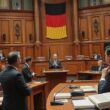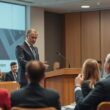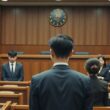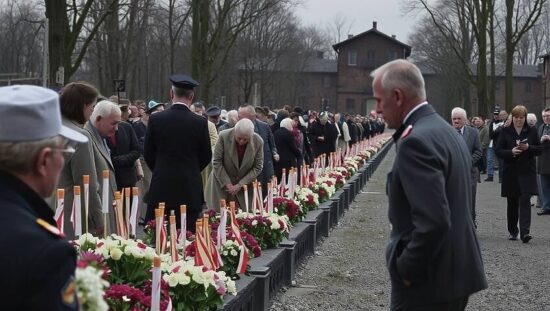In a ceremony marking the 80th anniversary of the liberation of the Auschwitz concentration and extermination camp on January 27, 1945, the International Auschwitz Committee opened its annual commemoration events with a minute of silence in the Lower Saxony state representation on Thursday morning.
The general secretary of the Austrian National Fund for the Victims of National Socialism, Hannah Lessing, read out the speech of the survivor Marian Turski, who was unable to attend due to health reasons. “Think about where and how Auschwitz began” the speech said. “Think about how it is today with democracy and your society, and how you imagine your future. Think about how many European countries have extreme right-wing parties that connect the old Nazi slogans with new hatred and try to win over especially young people in their fight against democracy.”
Turski called on people to follow the “eleventh commandment” of his friend and fellow prisoner Roman Kent. “You shall not be indifferent. That is my message to those who come after me, to young people, to all of you” the speech continued. “Do not be indifferent if minorities are discriminated against. Do not be indifferent if loud populist nationalism tries to take over the world for itself.”
Lower Saxony’s Minister-President Stephan Weil (SPD) drew a connection to the 75th anniversary of the German Basic Law the previous year. “It was also repeatedly recalled that this Basic Law has something like an unwritten heading” Weil said. “This unwritten heading reads ‘Never again.’ Fulfilling this task is and remains the duty of the living, and we must face it.”
German Chancellor Olaf Scholz (SPD) described the Basic Law as a counter-model to the Nazi dictatorship. “Just today, in the light of exploding populism and national radicalism, in the face of calls for brutal solutions, in the face of increasingly shameless attempts to normalize extreme-right positions, just today we must not take a single step back” Scholz said. “On the contrary: we must stand up and defend ourselves.”
On January 27, 1945, the Red Army liberated the remaining prisoners of the Auschwitz-Birkenau extermination camp. In the Auschwitz complex, at least 1.1 million people were murdered during the National Socialist era. In total, the Nazis and their collaborators killed six million Jews.
Alone in the “Operation Reinhardt” around 1.7 million Jews from the so-called “General Government” were killed between 1942 and 1943 through mass shootings and in the extermination camps of Belzec, Sobibor, and Treblinka. In the Majdanek extermination camp, around 60,000 Jews were hanged, shot, or gassed. The number of Jewish victims in Chelmno, the first National Socialist extermination camp, is estimated at at least 152,000.
Besides Jews, Sinti and Roma, homosexuals, people with disabilities, war prisoners, political persecutees, and as “asocial” groups, which included, for example, the homeless, the unemployed, and prostitutes, were also persecuted and murdered.





